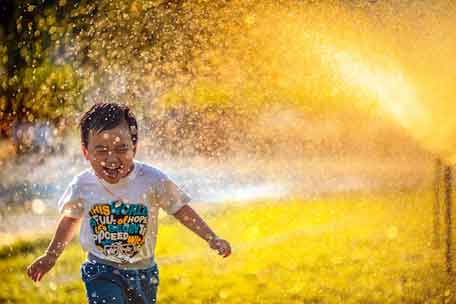
Kids running around, playing games, staying out till the streetlights come on!
That was Charles Brewer's childhood — and dream. To make it happen in modern-day America, the entrepreneur developed Glenwood Park in Atlanta, a neighborhood that hewed to the tenets of "New Urbanism." That meant it had "town houses, offices, retail, walkable streets, a nice town square, and a park," Brewer said.
This would be enough, he hoped, to get kids outside to frolic like it's 1979.
But frolic that way they did not.
"I'm still proud of it," Brewer said of his development. "But it failed to achieve kid freedom." How come?
"Because there still were cars."
That was in 2005. In 2011 Brewer opened a new development, this one for vacationers and anyone else interested in his halcyon vision of kids out and about on their own. He named it Las Catalinas. It's a beach town in northwestern Costa Rica.
It, too, is walkable, with parks, pedestrian paths and plazas. But this time?
No cars.
Result?
Says a smiling Brewer: "Kid freedom just happens."
Especially during the early months of the pandemic, when some vacationing families decided to make Las Catalinas their home for the Covid-days, "It was a magical moment," Brewer says. "We went from 30 or 40 to 150 families and lots of kids. We used to have nightly games of manhunt through the whole town, with a very wide range of ages."
That kind of fun is now generally the stuff of history books, campgrounds and Steven Spielberg movies. The throughline that connects them all? Way fewer cars. Sometimes even zero. But a couple of other ingredients also come into play (as it were):
— Trust in one's neighbors.
— The shared belief that kids can do things on their own.
— Knowing no one will call 911 just because they see a kid unsupervised.
— And, crucially: On vacation, as at campgrounds, as in the olden days, organized activities do not dominate kids' lives. They have their afternoons and evenings gloriously free.
Play happens automatically when there are other kids around and they're not in a class or on a device.
The play drive is incredibly powerful. It was installed by evolution to make sure kids would learn the skills they need to function happily in society: How to deal with boredom, risk, fear and frustration; how to communicate, compromise and come up with something to do. Play is the most enriching and educational activity around, which is why it is so key to child development. And why Brewer worked so hard, for so long, to bring it back.
Of course, it shouldn't be that the only kids enjoying old-fashioned free play are on vacation, or in "Stand by Me." So, what can you do in YOUR neighborhood RIGHT NOW to create a little bit of the Las Catalinas' magic?
Why not:
— Get your local government to make some "play streets" officially car-free. (Or do it unofficially, with a couple of traffic cones and sawhorses!)
— Organize a block party, so neighbors meet, and kids have a chance to play.
— Take turns sitting outside one afternoon or evening a week as the designated "eyes on the street."
— Create a Playborhood — an area or even just a single yard where kids know play is encouraged, and adults approve of kids going there.
— Start a Let Grow Play Club before or after school at your kids' school. That's when a bunch of kids of all different ages get a chance to enjoy old-fashioned, "loose parts" free play in a No-Phone-Zone. Our Let Grow Play Club guide for schools is free!
At Las Catalinas, Brewer says, "You'd be sitting at a restaurant and this pack of kids just goes blasting through. It is such fun."
Be like Brewer: Do not let something this precious go extinct. Save play.


 Contact The Editor
Contact The Editor
 Articles By This Author
Articles By This Author